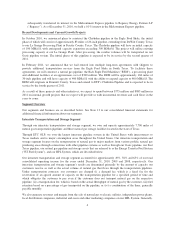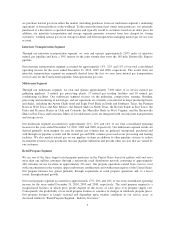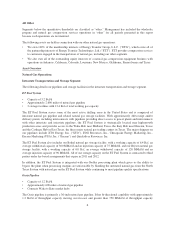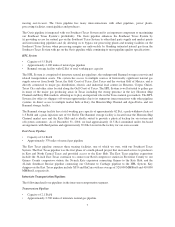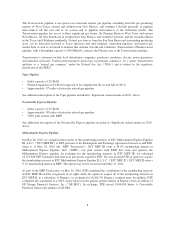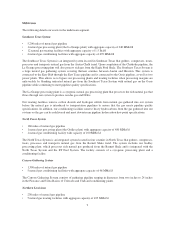Energy Transfer 2010 Annual Report Download - page 16
Download and view the complete annual report
Please find page 16 of the 2010 Energy Transfer annual report below. You can navigate through the pages in the report by either clicking on the pages listed below, or by using the keyword search tool below to find specific information within the annual report.company” under the NGA subject to the FERC’s regulatory jurisdiction. We also hold a joint venture interest in
the Fayetteville Express pipeline, an NGA-jurisdictional interstate transportation system subject to the FERC’s
broad regulatory oversight.
The FERC’s NGA authority includes the power to regulate:
• the certification and construction of new facilities;
• the review and approval of transportation rates;
• the types of services that our regulated assets are permitted to perform;
• the terms and conditions associated with these services;
• the extension or abandonment of services and facilities;
• the maintenance of accounts and records;
• the acquisition and disposition of facilities; and
• the initiation and discontinuation of services.
Under the NGA, interstate natural gas companies must charge rates that are just and reasonable. In addition, the
NGA prohibits natural gas companies from unduly preferring or unreasonably discriminating against any person
with respect to pipeline rates or terms and conditions of service.
In September 2006, Transwestern filed revised tariff sheets under Section 4 of the NGA proposing a general rate
increase to be effective on November 1, 2006. In April 2007, the FERC approved a Stipulation and Agreement of
Settlement (“Stipulation and Agreement”) that resolved primary components of the rate case. Transwestern’s
tariff rates and fuel charges are now final for the period of the settlement. As a part of the Stipulation and
Agreement, no settling party shall seek, solicit or financially support a change or challenge to any effective
provision of the Stipulation and Agreement during the term of the Stipulation and Agreement. Transwestern is
not required to file a new rate case until October 1, 2011.
In December 2009, the FERC issued an order granting Fayetteville Express Pipeline LLC (“FEP”) authorization
to construct and operate the Fayetteville Express pipeline, subject to certain conditions, and FEP accepted the
FERC’s certificate. Interim service began on the Fayetteville Express pipeline in the fourth quarter of 2010 and
commenced service to all of its firm shippers on December 1, 2010, with the primary term of each firm shipper’s
contract commencing by January 1, 2011. The rates charged for services on the Fayetteville Express pipeline are
largely governed by long-term negotiated rate agreements. In the certificate order, the FERC also approved cost-
based recourse rates available to prospective shippers as an alternative to negotiated rates.
In April 2010, the application for authority to construct the Tiger pipeline was approved by the FERC and field
construction began on the pipeline in June 2010. The Tiger pipeline was placed in service on December 1, 2010.
The rates charged for services on the Tiger pipeline are largely governed by long-term negotiated rate
agreements. In June 2010, we filed an application for authority to construct and operate a 0.4 Bcf/d expansion of
the Tiger pipeline with the FERC and in February 2011 we accepted the FERC’s order authorizing the
construction and operation of this expansion and the rate-related arrangements for the services to be provided on
this expansion.
The rates to be charged by NGA-jurisdictional natural gas companies and their terms and conditions for service
are generally required to be on file with the FERC in FERC-approved tariffs. Most natural gas companies are
authorized to offer discounts from their FERC-approved maximum just and reasonable rates when competition
warrants such discounts. Natural gas companies are also generally permitted to offer negotiated rates different
from rates established in their tariff if, among other requirements, such companies’ tariffs offer a cost-based
14


